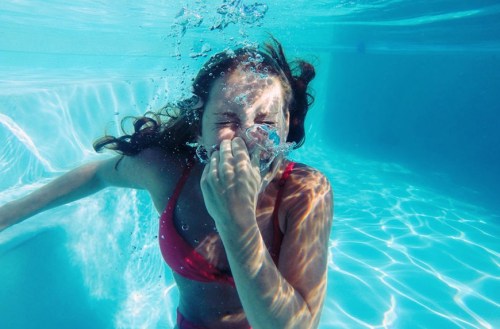Whether you like to swim and splash around or you’d rather lounge on your avocado float, rocking your swimsuit and tiny sunglasses, you’ll likely (hopefully!) clock a fair amount of pool time this summer. But, inevitably—even when you swear to only breathe through your nose and not so much as open your mouth to laugh—at some point, you’ll end up with a mouthful of pool water. (Just pray it’s not in the shallow end near all the kids…)
Gross? For sure. But is it harmful? Pools are loaded with chlorine to kill germs, but how exactly do these chemicals affect your gut? To find out, I called Gina Sam, MD, a top gastroenterologist in New York City.
Keep reading to find out how chlorine affects the gut.

The double-edged bacteria-killing sword
First things first: What exactly is chlorine? “Chlorine is a naturally occurring element. It’s on the periodic table,” Dr. Sam says. (Shout out to everyone who already remembered that from 10th grade chemistry!) When chlorine is dissolved in water, a chemical reaction (we’re not done with the high school flashbacks yet) forms an anti-fungal and anti-bacterial compound called hypochlorous acid.
“When water sits stagnant, it breeds algae and bacteria,” Dr. Sam says. “So the chlorine is added to kill all of that.” Here’s the tricky part: chlorine has the power to kill both good and bad bacteria—not such great news for your gut, which is counting on that good bacteria to thrive to keep you’re digestive track working and your immune system in top form.
“We don’t actually know how much chlorine it takes to kill the good bacteria in the gut because more scientific studies need to be done on this,” Dr. Sam says. Her general philosophy: A few mouthfuls of the stuff isn’t going to hurt you, but it’s generally not a good idea to make a habit of gulping down pool water, primarily because of what else can be lurking in there. To that point, it’s a lot riskier to swim in fresh water without chlorine because, without the antimicrobial agent, you’re more susceptible to contracting e. coli, norovirus, and other bacterial infections.
“When water sits stagnant, it breeds algae and bacteria. The chlorine is added to kill all of that.”
After all, the Environmental Protection Agency requires that all drinking water in the U.S. has a detectable amount of chlorine. It’s for the same reason: to kill harmful bacteria that can make its way into the water system. “Again, we don’t know how much chlorine it takes to kill the good bacteria in your gut, too,” Dr. Sam says. The EPA maintains that there are no studies linked to chlorine harming the body, but it’s certainly not a bad idea to pop a probiotic daily to keep your microbiome in tip-top shape.

What about salt-water pools—are they healthier?
You might have noticed that salt-water pools are popping up in more hotels, gyms, and homes. What’s the deal with that? Are they better or worse than ones filled with chlorine? “They both work the same way, actually,” Dr. Sam says. “With salt-water pools, a generator is used to convert the salt to chlorine.” Then, she offers up another flashback to chemistry class: “Salt is sodium chloride, with the chloride part being the bacteria-killing component.”
She adds that because salt-water pools are more natural, she does consider them to be more gentler on the body (AKA less likely to cause skin irritation). “Even if you go out in the ocean and swim, there is chlorine because there is salt in the water and salt is sodium chloride,” she says. “But oceans are the best because nature has determined for itself exactly how much chlorine is needed to kill harmful bacteria. But more scientific studies need to be done to figure it out for pools.”
So there you have it: Not only will chlorine not kill you, it will actually keep you safe. Now, you can swim a little more peacefully. That is, except in the shallow end with the kids—you’re on your own with that one.
Speaking of salt water, here’s what happens when you drink it every day—yes, on purpose. And as if this helpful info wasn’t enough to convince you that chlorine serves a purpose, take a look at how dirty public pools actually are.
Sign Up for Our Daily Newsletter
Get all the latest in wellness, trends, food, fitness, beauty, and more delivered right to your inbox.
Got it, you've been added to our email list.











